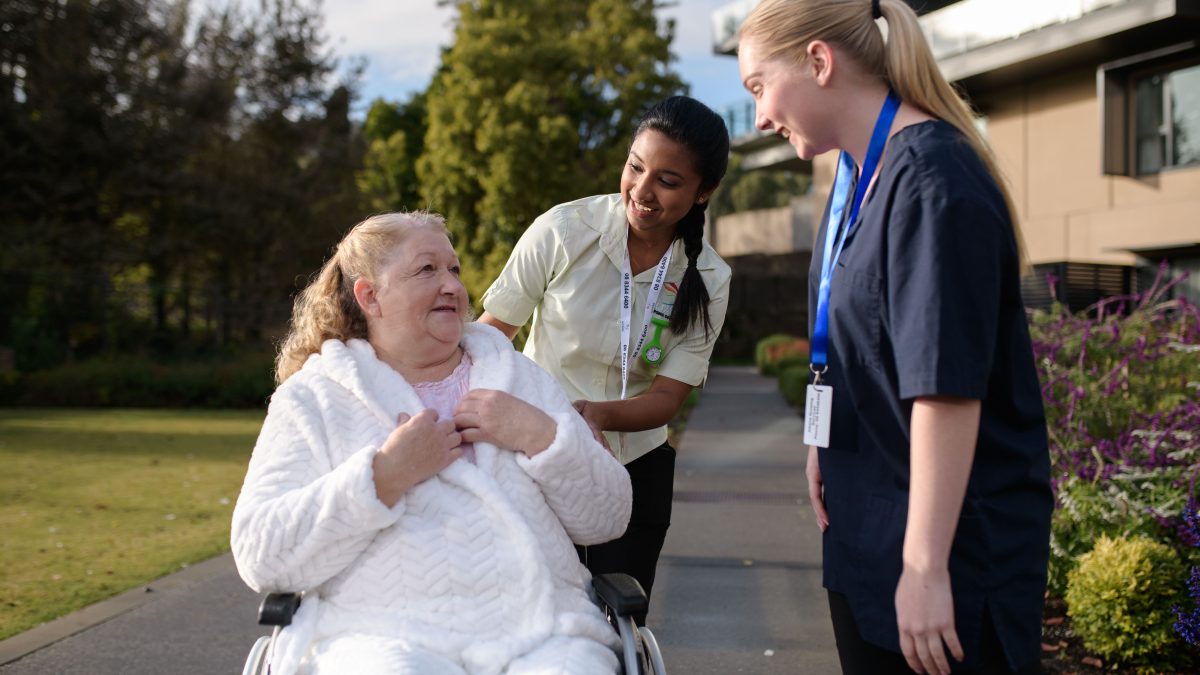
Registered Nurses – Celebrate the festive season with an extra bonus!
December 9, 2024
How to Build Confidence as a New Nurse in Aged Care
January 24, 2025Navigating Specialisations: Finding Your Path in Nursing

Choosing a specialisation in nursing is a significant decision in a nurse’s career. The healthcare world is always evolving, with a wide array of specialities for nurses to consider, all offering different opportunities, challenges and rewards. Some of these specialisations include working in hospitals, emergency care, paediatric nursing, mental health and surgical nursing, and aged care just to name a few.
For anyone contemplating which path to take, aged care nursing offers unique opportunities to make an impact on the lives of older adults and can be deeply rewarding. Whilst often overlooked, aged care nursing allows nurses to develop diverse skills, form meaningful connections, and as the global population aged, the demand or aged care nurses is rapidly increasing. By 2050 the number of older people in Australia is expected to increase significantly, reaching 1.8 million people 65 and older. This increase will lead to even more of a focus on aged care facilities, and overall healthcare targeting older adults. For nurses, this creates a lot of opportunities to step into roles that can have a meaningful impact whilst also offering job security, as the need for healthcare services for older adults is only expected to rise.
Why Choose Aged Care Nursing?
Aged care nursing goes beyond medical treatment; it involves holistic care that addresses physical, emotional, and social aspects of a person’s life. Here are some compelling reasons why nurses might choose aged care as their specialisation:
One major benefit of working in aged care is the abundance of job opportunities available. The demand for skilled aged care workers is high, increasing the chances of finding a role that suits you.
Aged care provides a unique and rewarding working environment. You have the chance to interact and connect with people from all different backgrounds, forming meaningful relationships with residents. Some elderly residents often don’t have family who regularly visits them, so the connections you build with them can greatly add to their mental and physical well-being. As an aged care nurse, you are often the frontline provider of emotional support, a friendly face, and a compassionate listener. The gratitude and trust built over time with residents and their families provide a profound sense of personal fulfillment. You may even find you learn some valuable life lessons from their experience and wisdom from many years of life.
The various aspects of residential care gives aged care nurses the skills and knowledge that are essential for succeeding in leadership positions. Working in aged care provides the experience of learning how to manage teams, delegate tasks and resolve conflict, all useful skills needed to take charge and lead others to make a difference in the lives of residents.
Aged care nurses are often required to wear many hats, from managing medications and monitoring chronic conditions to offering rehabilitation support and providing end-of-life care. This diversity allows you to develop a wide range of skills in many different areas like palliative care, mental health, and chronic disease management. These skills are highly transferable and can open doors to other specialisations or leadership roles within healthcare.
Although common in other areas of nursing as well, aged care nurses frequently collaborate with other health professionals like physiotherapists, occupational therapists and social workers. This collaboration allows for professional growth and helps to broaden your knowledge with experts of different fields to be able to benefit residents holistically.
Important skills for working in aged care
Whilst aged care nursing can be highly rewarding, you should keep in mind that there are certain qualities required to thrive in this type of environment. Some essential qualities to have are patience, empathy, and resilience to be able to deal with managing chronic diseases, mobility issues and cognitive impairments that are common within residents. Having good communication skills is also critical, for interacting with residents but also with families of residents, and other health professionals. Aged care often involves end of life care, so when deciding to work in this field you must feel comfortable dealing with grief and loss. Whilst this may be emotionally challenging, providing comfort and dignity to residents during these times can be one of the most meaningful and impactful parts of this job.
There are many specialisations and pathways you could take when considering your nursing career, however, aged care offers both personal and professional rewards. It provides meaningful work and the chance to make a lasting impact on the lives of older adults. As the population continues to age, there will be even more of a need for aged care nurses to deliver compassionate, high-quality care.
If you’re a nurse considering your career path, aged care offers not only a rewarding experience but also the opportunity to be part of a growing and essential sector of healthcare.
Altaira are always on the lookout for new aged care nurses, among other jobs. To check out a list of available roles and employment opportunities, visit: https://www.seek.com.au/Altaira-Services-jobs/in-Adelaide-SA-5000










